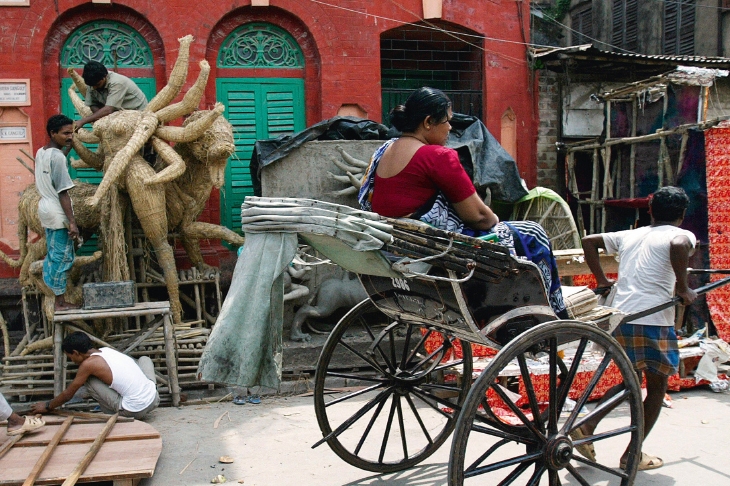Writing of his grandmother’s cremation, Kushanava Choudhury reflects in The Epic City that, while his expatriate Indian cousins are separated from the occasion, ‘I was sipping tea in Nimtala, present in the moment at the centre of our world’. It’s Choudhury’s longing to be back in this centre, which might have seemed less than obviously central to a metropolitan American, that takes him to Calcutta after he graduates from Princeton. He spends a few years working at the Statesman, Calcutta’s most venerable English newspaper, and later returns to the city, eventually getting married to his girlfriend, who happens also to be an American of Bengali origin.
Such returns aren’t unheard of, but they are unusual, though they also often seem to be associated with literary production — Suketu Mehta’s 2004 Maximum City: Bombay Lost and Found, for example, followed the author’s return to his birthplace. At the start of The Epic City, Choudhury’s return seems less purposeful or directed. He wonders what he is doing in Calcutta, a city apparently well past its prime — indeed, when he’s at the Statesman, he becomes so depressed he goes to see a psychiatrist, who asks why he’s come back to Calcutta: ‘I wasn’t sure any more.’
The book begins in a fragmentary, slightly disjointed way. At times the chapters can feel like newspaper pieces. The earlier part of the book is sometimes too condensed. Writing of expeditions with a Statesman colleague, to whom the book is dedicated, Choudhury says:
Soumitro and I had walked the city’s streets, discovering airy Sephardic synagogues, Armenian churches, and temples to the Jain saint Mahavir. In the old Black Town, we had mingled with the deity sculptors among the lanes of Kumortuli, communed at the annual chariot festival at the Marble Palace and witnessed clandestine human hook-swinging during the Raas festival.
The city here alluded to, rather than evoked, made me think of other books that do invite a reader into Calcutta life, among them Amit Chaudhuri’s Calcutta: Two Years in the City; Neel Mukherjee’s The Lives of Others; the world of popular Bengali theatre in Saikat Majumdar’s novel The Firebird; Sunil Gangopadhyay’s Pratidwandi (The Adversary). I thought, too, of the Calcutta I’ve begun to get to know in the last few years, a city of beautifully decaying heritage buildings, of amply upholstered, peaceable, friendly and loquacious inhabitants, and, a more recent change, of economic ambition, evident in the new malls and new industry outside the city, and in the rebranding of public spaces by the Trinamool Congress state government.
But as The Epic City continues, it opens out into some beautifully drawn episodes. One deals with adda, the peculiarly Bengali version of conversation that’s at an intersection between chat, debate, and, on this occasion, a writers’ group. The scene Choudhury draws is a delightful one: at the end of a tiny L-shaped bylane in North Calcutta, there is a weekly Wednesday afternoon meeting of talkers, writers, and poets:
When the room is full, it looks like the inside of a Calcutta minibus. Many of the men and women there have travelled on trains and long-distance buses from neighbouring towns and suburbs. Like daily commuters, they have grown to know each other. Here they live a second life of literature. At the adda, they are recognised as their other selves, as artists.
Unusually in the book, the scene is rich in dialogue, inflected with pathos as well as bathos. As one of the participants, Ashok Lakhdar, observes: ‘The joy and happiness from creating poetry can’t be explained… But poetry is very cruel.’
Choudhury makes excursions into different worlds within the city: the trade unions, the now-defunct docks, the annual spectacle of Durga Puja, in which the city remakes itself imaginatively. He examines some of the different recent traumas — Partition, famine, the ongoing attempts at Marxist revolt in the countryside — and the effect they have had on the city. The influx of refugees after famine in the 1940s, for example, marked the first time that large populations slept on pavements and scavenged for food.
And he is good on the refugees from East Bengal, who people the films of the avant-garde director Ritwik Ghatak, and whose makeshift dwellings were built of bamboo: ‘They lived in rooms lit only by lamplight, whose walls were as fragile as their lives had become.’ The end of Chaudhuri’s story slows down to note Calcutta’s river, the Ganges, which he describes tenderly as the colour of ‘milky tea’, and in a lovely ending, he transmits the self-renewing, infinitely modern energy of the city, which seems everywhere decaying but in fact is always ‘just beginning’.






Comments